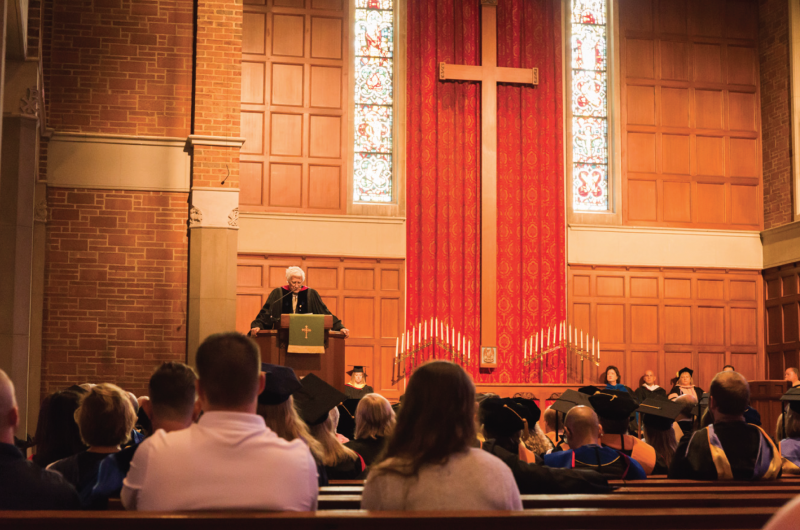*Republished from the September 2015 issue of The Kayseean
By Rachel Burrus
On August 26, 2015, King University’s opening convocation took place at First Presbyterian Church on Florida Avenue, which was quite the change from holding the services at the campus’ chapel. After the traditional processional, interim president Dr. Richard Ray welcomed students, faculty, and staff. Dr. Shannon Harris introduced the speaker, Dr. Nicholas Wolterstorff, who delivered a powerful convocation address on “What is a College Education for?”

This speech was specially tailored for King University’s purposes and offered deep reflection concerning the distinctly traditional, Presbyterian Christian higher education. Dr. Wolterstorff stressed early on in the address that we live “in economically turbulent times.” Technological advances and social revolutions inhibit relying on tradition, or so it seems on a broad spectrum. Dr. Wolterstorff asked the congregation what is the social context that is present within higher education offered at King University. What should be the goal? The answer is simply that graduates should hope in playing certain social roles upon entering the real world.
In past societies, roles were ascribed to individuals without a choice of alteration. Now, in America, individuals possess the freedom; and, in fact, must choose their social roles. For upcoming graduates, hope should be placed in having the necessary equipment for future societal roles, not solely job training. From a philosophical standpoint, Dr. Wolterstorff offered three points in occupational advice.
Firstly, he recommended that one must seek something that one is good at and possesses a natural talent in. Secondly, along with this talent, what one pursues must give one fulfillment. Lastly, in what Dr. Wolterstorff stated was most important, one must ask if this pursuit is worthwhile. In doing this, is one “faithful to God” while also providing genuine service to fellow human beings?
Dr. Wolterstorff ended his address on a powerful note – that in collegiate liberal arts education, one’s eyes behold the “wonder and awe at the intricacy of God’s creation” while also having genuine horror at the tragedies human beings are capable of committing against mankind and the earth. Wolterstorff closed by stressing, in liberal arts education, we must continue earnestly asking ourselves if we understand and acknowledge both wonder and horror. “Is such education still possible now in this place? Or is its day over? Is collegiate education now just job training?” concludes Dr. Wolterstorff.
